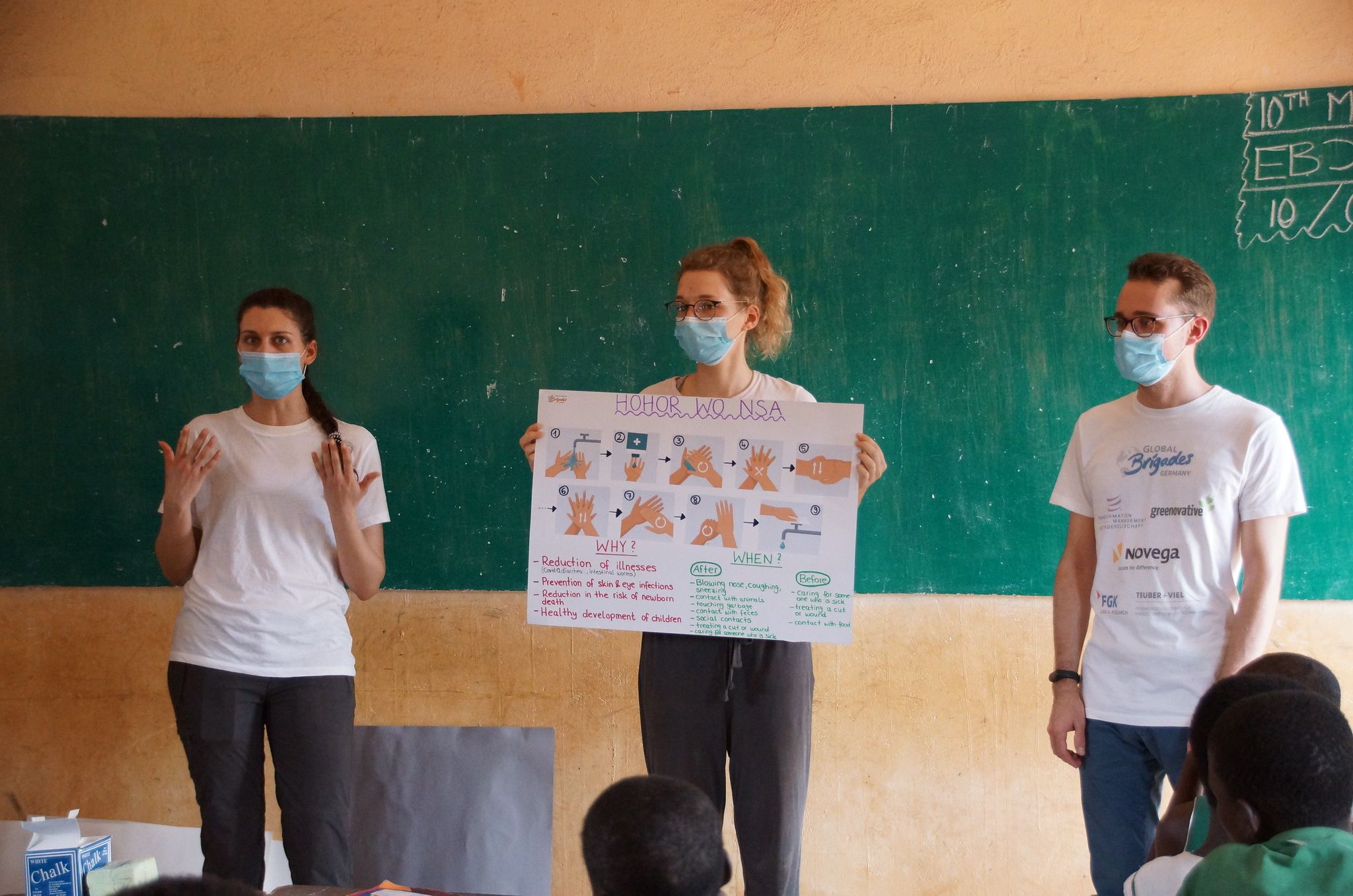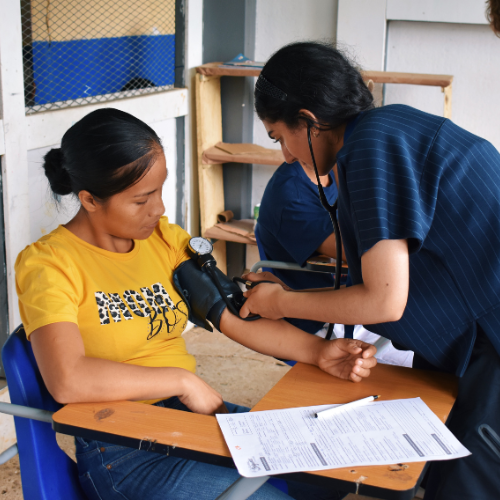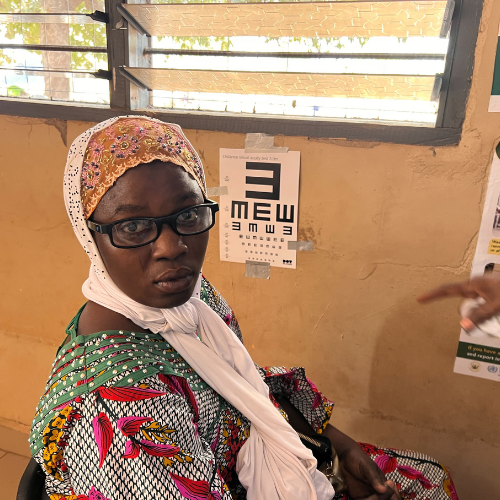For any student looking to go into a medical career, medical clubs are a fantastic idea. Not only will you learn more about your chosen field of study, but you’ll also strengthen your resume and personal statement for liberal arts colleges and medical school admissions.
Learn about why Global Brigades is the largest student-led movement for global health.
8 Ideas for Pre-Med Clubs
These ideas for pre-med clubs for high school or undergrad students can increase your chances of success in the college application process, help you learn more about the medical field, and end up being more fun than you anticipated.
Check out these organized lesson plans for general pre-med clubs.
What are some ideas for a medical club? Specific ideas for a medical club would include forming a school chapter of Global Medical Brigades or Doctors Without Borders. More general ideas would be to register an anatomy club, sports medicine club, or biology club. You can invite guest speakers, volunteer in your community, and work together on relevant science projects.
1. Global Medical Brigades Chapter
Global Medical Brigades is an arm of Global Brigades, an internationally recognized health and economic development organization. As a Medical Brigade volunteer, you can play a critical role providing access to doctors and medication in community partners. You’ll also forge relationships to help community members identify and address their development goals.
Global Brigades is a non-profit aiming to systematically address poverty through a holistic model that includes providing vulnerable communities access to healthcare, economic opportunities, and sanitation solutions.
The cornerstone of a Brigade Chapter is organizing a “brigade,” as we call it. On a Brigade, students from your Chapter will travel to a part of the world where access to primary healthcare and medicine is nearly absent.
Brigades may involve:
- Volunteering alongside local doctors to create a mobile clinic in remote and rural areas
- Helping build a new clean water system to pipe fresh water in homes to prevent water borne illnesses
- Training local community health workers to foster health education
- Much, much more!
For pre-med students, a Brigades Chapter is far and above the best medical club to start. In particular, volunteering as a Chapter Leader is one of the best ways to apply practical principles of leadership and broaden your perspective as a global citizen.
Below are the simple steps to establish or broaden Global Brigades’ mission at your school:
- Find out if your school has an active Global Medical Brigades chapter by checking out our university map. If it does, you can connect with the Chapter Leader listed on the details page for your college.
- No existing chapter? No problem! Connect with the Global Brigades team who will help you create a Global Brigades Chapter by filling out this form.
- The Global Brigades team member will communicate with you through multiple calls and emails. Communicate consistently.
- Raise awareness for your Chapter on campus while connecting with other relevant organizations on campus or in your region, including other Global Brigade Chapters.
- Pinpoint when your Chapter will go on its first brigade: dates, country, program, etc. Later in the process, a Program Associate will support your brigade planning — recruitment, fundraising, flight booking, and anything else you need.
Go on your brigade, love it, then start planning for next year.
(Can’t travel? Learn more about TeleBrigades here.)
2. Doctors Without Borders
Doctors Without Borders (AKA Medecins Sans Frontieres) is an international organization providing medical professionals with volunteer opportunities in high-need communities across the globe.
High school Doctors Without Borders clubs typically raise awareness and funds to support the mission of Doctors Without Borders. Exhibit your empathy and dedication by joining a DWB club. (Here is a list of existing DWB clubs.)
If you want to start a DWB club at your high school, fill out this survey. You can also email them at studentchapters@newyork.msf.org with any questions about the program.
3. Medical Explorers
Medical Explorers is a specific program offered by Johns Hopkins All Children's Hospital to 10th-12th graders with an interest in healthcare careers.
A Medical Explorers group will hold monthly virtual meetings with various health professionals to talk about real-life experiences and advances in healthcare.
Medical Explorer requirements include:
- Enrollment in 10th-12th grade
- $45 dues (dues waived with proof of free/reduced lunch program)
- Commitment to monthly meetings
- Permission form from parent or legal guardian
4. HOSA Chapter
HOSA (Health Occupations Students of America) is a national organization recognized by the U.S. Department of Education whose mission is to promote healthcare career opportunities.
Since 1976, HOSA student organizations have provided pre-professional guidance to high schoolers who want to become doctors, nurses, etc. HOSA also organizes competitions for students.
Here is a guide to establishing a HOSA chapter at your school.
5. Anatomy Club
Anatomy club would be good for students looking to go into fields concentrated in external, internal, and microscopic anatomy. Dissections, academic autopsies, and studying embryos are all activities an anatomy club can engage in.
Consider inviting experts in the field of anatomy to speak to your anatomy club, including:
- Professors
- Researchers
- Veterinarians
- Surgeons
- EMTs
- Medical examiners
- The local coroner
This and the following clubs are more generic clubs which will not look as good on a résumé, but they may be much easier to form at your school. Many high schools or colleges only require a charter, bylaws, and a faculty sponsor to register a club.
6. Biology Club
Biology club could be a great group for students who don’t have a specific discipline in mind but are interested in sciences related to the medical field. The subject of biology applies to basically all of medicine.
Plus, most schools have a biology class, and that teacher would almost certainly sponsor the club or help you register.
Activities for a biology club include:
- Performing biology demonstrations for other students, families, etc.
- Attending or judging science fairs
- Working on a scientific paper as a group, whether for fun or to publish
- Picking up litter to help heal natural biomes
- Conservation projects
- Greenhouse or gardening projects
- Zoo visits
- Meet and greet with local biology teachers and faculty
- Volunteer to give free health screenings to underserved populations
- Arranging a fundraiser for cancer research, the local zoo, or an urban garden
- Inviting guest speakers with experience in biology, such as biotech leaders, researchers, maybe grad students who used to be in a biology club, etc.
7. Neuroscience Club
Neuroscience club is ideal for students looking to work in the neuroscience fields, such as:
- Neurosurgery
- Neurolinguistics
- Neuropsychology
- Social neuroscience
- Cognition
- Neural imaging
- And more!
Neuroscience clubs may not only help students gain acceptance into colleges and med schools, but they can also have educational fun.
These clubs can invite guest speakers to discuss advancements in neuroscience, try shadowing a neurological doctor at the local hospital, engage in relevant community service such as volunteer work in a psychiatric unit, and raise awareness for Mental Health Awareness Month.
8. Sports Medicine Club
If you’re interested in sports medicine (health coaching, sports injury recovery, sports chiropractic, fitness training, etc.), a sports medicine club may be the right choice for you.
The following activities can strengthen your resume for colleges and even future jobs:
- Talk about real-life sports injuries
- Assist with immediate athletic care alongside qualified pros who work with your school’s sports teams
- Go to the gym as a group, either to exercise or volunteer
- Raise awareness in areas of athletic health or fitness
- Discuss nutrition and its applications in sports medicine
- Observe rehabilitation techniques, such as physical therapy
- Help set up and break down for athletic games and practices
- Hear guest speakers with real-life sports medicine experience
Benefits of Medical Clubs for High School & Pre-Med Students
What are some benefits of joining a club? There are many benefits to starting or joining a medical club in high school or undergrad, including the following:
- Being involved in a medical club looks good for college admissions or medical school admissions. Guess what? Leadership looks even better. Tangible community and advocacy work through that club helps set your resume apart from the pack.
- Pre-med clubs provide access to other students with similar interests, not to mention faculty sponsors or guest speakers — all of whom can further your understanding of your chosen field of medicine and recent advancements.
- Many medical clubs promote increased access and awareness concerning healthcare, which is a noble good in itself. Global Brigades, in particular, is the best way for pre-med students to actively participate in global health work that both raises awareness and increases access to better healthcare in the developing world.
- Being in extracurricular activities, athletics, or clubs is good for your mental health. Clubs often give you a sense of control over your life, belonging to a group, an alternative to sitting around, and overall social fulfillment.
- Clubs can open up unique internship and research opportunities for members.
- Meeting regularly with folks sharing similar interests as you can easily lead to valuable friendships — both personal and, perhaps down the line, professional.
How to Start a Brigades Chapter
Few, if any, of these medical club ideas will allow you to truly create impact in a tangible way like Global Medical Brigades can do.
Start the process of creating a Global Medical Brigades Chapter at your university today. Sure, your medical school application will be a little more impressive. But, more importantly, you’ll make real progress towards increasing global healthcare access in the developing world.
Partner with the work being done on the ground — join an existing Medical Brigade today!





-1.png)